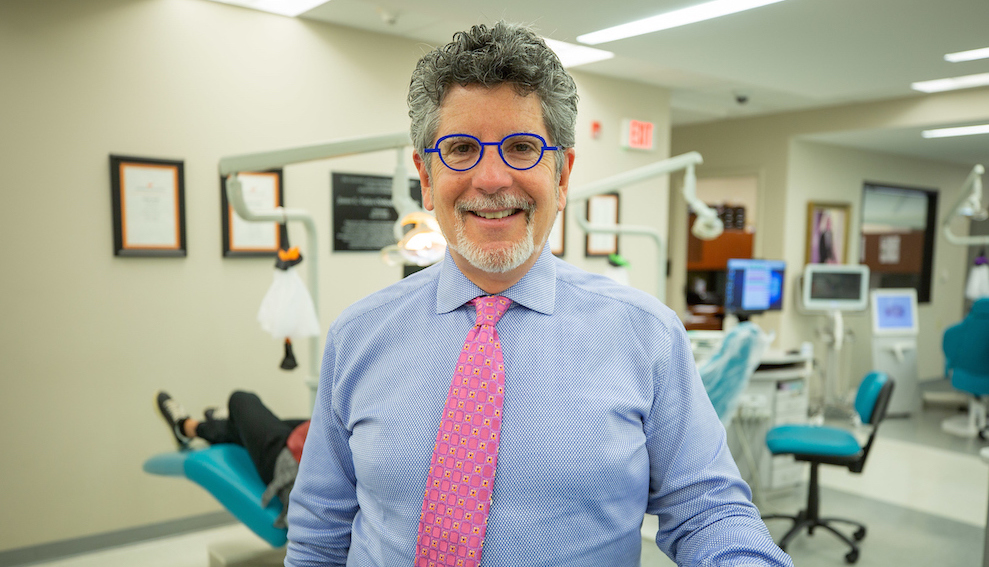
The new director of the Dental Sleep Medicine Clinic at the University of Tennessee Health Science Center wants the community to know that there are multiple ways to treat sleep apnea in adults and children, and his clinic is dedicated to finding the right solution for each patient.
Mitchell R. Levine, DMD, is board certified as an orthodontist and in dental sleep medicine. He joined UTHSC as an associate professor in the College of Dentistry in late summer. He plans to make the Dental Sleep Medicine Clinic a collaborative partner with other fields at the university and with clinical partners to treat sleep disorders and apnea in children and adults across the region.
The clinic focuses on oral device therapy for adults and orthodontic approaches with oral devices for children. In adults, these custom-fitted oral appliances hold the lower jaw in a slightly forward position preventing collapse of the airway. Worn during sleep, an oral appliance fits like a sports mouth guard or an orthodontic retainer. The patient is fitted with the device that best suits the mouth shape and the breathing issue. For children, orthodontics and jaw growth can be utilized to change the size, shape, and position of the jaw, resulting in better management of the breathing problem.
Sleep Apnea Impacts Quality of Life
Sleep apnea occurs when the airway collapses during sleep, obstructing the intake of oxygen and interrupting sleep. More significantly, adults who have sleep apnea are at increased risk for heart disease and stroke.
For children, sleep-breathing concerns center around the neurological, psychosocial, and decision-making development. Children with sleep-breathing problems are a new focus of the clinic. As a sleep-trained orthodontist, Dr. Levine is well-versed in treating children and will collaborate with physicians at Le Bonheur Children’s Hospital to help manage these breathing problems, which may affect quality of life and school performance.
The typical treatment options for obstructive sleep apnea in adults include CPAP (continuous positive airway pressure) machines worn during sleep, surgical interventions to improve airflow, and less-invasive oral appliance therapy. In children, treatment options have included the removal of adenoids and tonsils if necessary, and CPAP. With recent advances in facial orthopedics, the sleep-trained orthodontist can now change jaw positions in response to the apnea.
Increasing Available Therapies
“The intention of this clinic is to complete the continuum of sleep care for both children and adults in our community,” Dr. Levine said. “CPAP can work well, when it is tolerated by the patient. The challenge is that many adults struggle to comply with CPAP therapy or simply don’t want to wear the CPAP. Children, instead, may benefit from the structural changes associated with orthodontics and facial orthopedics, sometimes negating the need for CPAP. This clinic provides the missing pieces in managing sleep problems and contributes to the comprehensive care of sleep and breathing problems in Memphis.”
The clinic also has an education component, training dental students, residents, and fellows in recognizing patients who would benefit from this treatment and making referrals.
Dr. Levine comes to UTHSC from Jacksonville, Florida, where he practiced orthodontics and dental sleep medicine. He has lectured throughout the world on topics of adult and pediatric sleep-breathing issues and serves on the American Academy of Dental Sleep Medicine board of directors. He received his undergraduate degree at Vanderbilt University, a Doctor of Dental Medicine degree from the University of Pittsburgh and completed residency training at Temple University in Philadelphia.
The Dental Sleep Medicine Clinic, located in the Dunn Dental Building, 875 Union Avenue, Suite C 101, is accepting adult and pediatric patients. To contact the clinic, call 901.448.1463.
